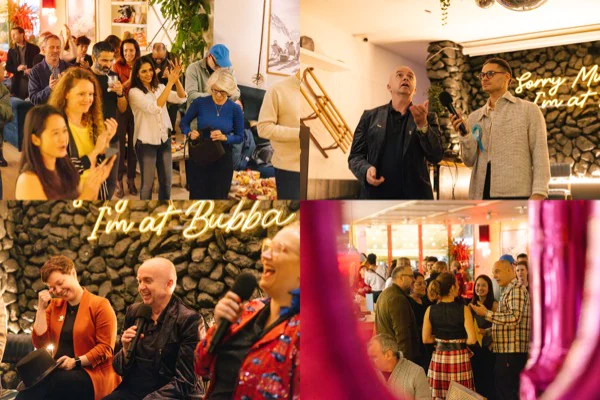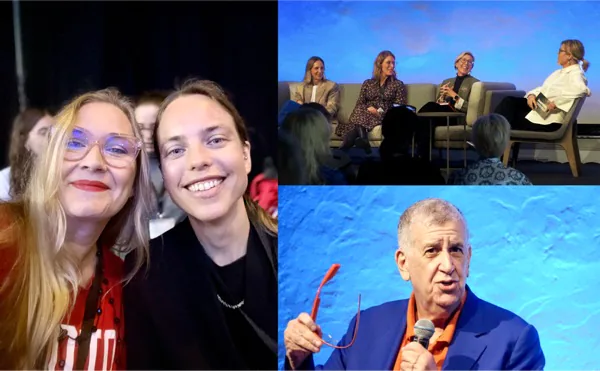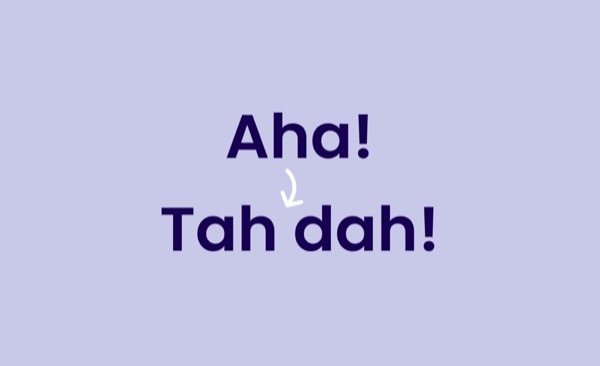Meet the wizard of cross-cultural collaboration
Say hi to Tobias Gruenfelder. We've been working with him recently in two capacities - first he's been facilitating with Priya, delivering a team development programme to a team at Siemens. He's also co-created our new Cross-Cultural Collaboration programme. More about that later, but first...
Introduce yourself Tobias!
In a nutshell... I am a magician, facilitator and researcher, and I organise events that spark unique learning 💥
I'm bringing a lot of different things together in my work life at the moment. For example, I'm looking at how leaders and organisations deal with cultural diversity, a subject that formed part of my PhD as well as my current research at Zeppelin University in Germany. I also work as a magician and believe that magic makes people curious; it stimulates people and opens up new discussions. Finally, as an intercultural trainer, I look at how to approach cultural diversity based on new research and paradigm shifts.
.jpg)
You talk about magic like a lubricant, as something that facilitates processes
Yeah, absolutely it does. It's certainly my experience as a magician - it's a visual language that can be understood by everyone.
I’ve been running one project for several years now, with the German Embassy and the Goethe Institute, a German cultural institute. It's called Magical German. They send me all around the world to teach German with the help of magic and it works really nicely because you can do tricks with vocabulary cards, so it's a very playful way to interact with language.
This is the beautiful thing about magic, it can connect to many topics and spark discussions, not only about magic. I really believe that performing arts, like magic, can help transform our societies for the better because they invite us to reflect, they generate abstract discussions and invite us to rethink things.
How did you find your way to magic?
Long story short... I used to play a lot of football and when we travelled to games, we played cards on the bus. One day someone did a card trick and that was it, I was fascinated. So, I got magic books and magic boxes, and got in touch with the Magic Circle community in Germany - they helped me to find mentors and I found my way into magic. So, it started with playfulness and continues with playfulness...
What fascinated you?
I think it triggered two things: one is the emotion of wonder because I thought, how is this possible?? Something disappeared in front of my eyes and I wondered how it happened. Secondly, I always loved good entertainment; seeing great magicians telling great stories fascinates me.
Why cross-culturality?
As I grow older, I realise that things I'm interested in are connected to my own life path. I grew up in the South of Germany, my mum is from the north and my father is from Italy, so, because of my family, I knew I would explore the world from a young age.
I studied PPE - philosophy, politics and economics - which is a very good foundation for a lot of endeavours, because they are important disciplines. Transculturality emerged because I was interested in other cultures, plus I did semesters abroad and internships in different parts of the world, including South Korea and Kenya. This led me to wonder how organisations deal with cultural diversity. It is a very important topic for the future partly because of ongoing migration, but also because of the different value chains when it comes to sustainability and climate change - we have to rethink cooperation across cultures. How organisations, from private and public sectors, deal with cultural diversity currently is very interesting.
Organisations have a goal and every employee works towards that goal, but sometimes there is a cultural disconnect?
What even is culture? I read a study that stated there were over 160 different definitions of culture! It's an ever-changing phenomena. I think that, for many decades, we have centralised culture to some extent... it was considered a collection of customs, traditions and beliefs. Out of this came comparative studies - the German culture here, the Chinese culture there, the British, the US, and so on. We tended to look at cultural differences and how to avoid misunderstanding, and conflict. But we forgot to look at what brings us together, the commonalities between us. Cultures don't exist next to eachother, they exist with each other.
An organisation's culture depends on the network it's in - its connections and relations with customers, and suppliers. The organisation is not a fixed container of culture, but part of something bigger so it's increasingly important to manage these relationships, to learn from, and with, eachother.
Culture is not static, it is a process. I like Milton Bennett’s definition, that culture is an ongoing coordination of meaning, which indicates that we are all, to some extent, products of cultures, plural. We are carriers of culture, but we also shape it and this process is ongoing too. By overemphasising cultural differences, we overlook the commonalities that unite us. It is great when organisations identify commonalities in their networks and work from this perspective.
How do you measure cultural change in organisations?
It's a topic that should be approached holistically as it provides both opportunity and challenges for organisations. Often, unfortunately, cultural diversity is reduced to one indicator, like gender equality. But all cultural diversity is important!
So first of all, cultural diversity should be part of an organisations' overall strategy, not just a box-ticking exercise. If an organisation takes this seriously, they involve all stakeholders and figure out how to work on it from the top down. An organisation that is not willing or able to deal with cultural diversity is going to to fail, so it's part of risk management.
The second step involves leadership skills - are they able to work with international teams? Can they recognise and pay attention to cultural diversity, bringing people together to spark a sense of belonging?
Global corporates with offices around the world are dealing with this every day and they've gained a lot of experience over the years as they have to make sure information and knowledge don't get lost as the org grows or changes.
What is transcultural learning?
There are cultural differences and we should respect them, but we must look beyond them. That's transcultural learning - respecting our differences while collaborating, cooperating, gaining new experience, new understanding, new meanings, and new solutions. We can learn from, and with, each other.
You and Abracademy have developed the Cross-Cultural Collaboration programme; tell us about it
Yes! I'm really excited about this programme!
First, we ask people to reflect on cultural dynamics as well as their own cultural background. It's good to start with cultural self-awareness, to have a deeper understanding of what shaped you and where you came from - the region, the nation, the industries and organisations you worked in. So the first part is opening up to gain deeper understanding and cultural self-awareness.
The second step in the programme is to look at what happens when we interact and cooperate with people from other cultures - what are the unconscious biases that come into play, what's the impact of different perspectives, what can hinder or shape cooperation?
In the third part, we want to think about culture and how groups can work together, create new shared meanings and shared understandings by sharing experiences, activities and practises. Think about the next step, together as a team.
These are the three stages in the programme, reflecting about yourself and your interactions with people from other cultures, and think about how to create a sense of belonging for your team.
That's relevant across functions and roles, as well as cultures?
Yeah, absolutely. This is how the programme is designed. We can adjust it to specific needs, but in general, international teams can go through the different stages together. Research is showing that multicultural teams tend to outperform or underperform compared to monocultural teams. And it starts with the team having an awareness of their cultural diversity, for example one person has a background in engineering, another was a lawyer, and a third, a political scientist. They all have a different language we do not recognise this, it leads to a lot of misunderstanding. Such multicultural teams have many benefits when it comes to innovation and creativity. And there's another benefit I'd like to highlight: studies are showing that the well-being of individuals is increased by working in multicultural teams because it's interesting! It might sometimes be challenging, but it's a very meaningful experience to work with people from other cultures if it is done in a proper way, with that awareness I talked about.
What causes multicultural teams to over or under perform?
One of the main factors is not recognising the cultural diversity present. So you have a mindset of 'this is how we do business here, that's how they do business over there'. A lot of misunderstanding comes from this, which leads to frustration making it really difficult to work together.
We are living in a world where we realise that we're not going to end up as one village, where we're all the same. When we look at the political landscape, we realise the world is very complex; a lot of regions will stay as they are, continue with their own unique way of doing things. Cultural differences are important and they will always be there, but let's focus on what brings us together - what can we achieve together. This starts with an attitude of openness and suspending judgement. Can you engage in a situation with people from other cultures and not be immediately judgemental? Of course humans will always judge, but you can postpone your judgement. It's an opportunity to evolve, leave our assumptions and agendas behind.
Then we might understand each other better and talk about our different issues or opinions. But we need to start this process with non-normative attitudes and observations. We can do this on an individual level and on an organisational level - as an organisation, are we able to engage in these processes? We need to start with the transcultural learning processes, which starts by not judging immediately, being polite and respectful.
Acknowledge differences exist, they're important to tolerate and respect, and also celebrate! Because difference isn't a negative thing. But focus equally on what people have in common.
But we have to be realistic, everyone doesn't have to love everyone! I can even recognise the self-interest of the other person and have empathy, understand what their interest is. This is where you can find commonality, despite all the different interests in the world, in political and business contexts. The question is how we can connect them?
Change of topic... who is the best leader / boss / manager you've ever had?
I can't name a specific person, but I'd like to highlight that often, when we think about leadership, we tend to think about individuals. Whereas I like to think about leadership as a relational process, something that can be distributed among many people. What should leaders do, what should leaders know? You can have a list of competencies but no leader in the world ticks all the boxes. It's idealistic. Let's not focus so much on individual characteristics that leaders need, but rather characteristics and skills that emerge between people. Great leaders always have good relationships to people around them.
Why do we need magic in this world?
I like magic as a performing art and I think magic reminds us that our perception is limited, it invites us to reflect on how we perceive the world. It reminds us that we can reimagine things, that the unimaginable is possible, that we can reimagine the status quo. This is beautiful and these are beautiful reminders about how this world works. We should always be curious and willing to reimagine how things are done.
What book are you reading at the moment?
Tyson Yunkaporta's Sand Talk: How Indigenous Thinking Can Save The World. It's a beautiful book that offers a look at our world from an indigenous perspective.
One final question, from the Serendipity Machine: what is the scariest thing you've ever done?
I've done many scary things because I tend to over trust and follow people! Also, I was once invited to perform magic in a slum outside of Nairobi. At first, it was scary, I didn't know what to expect, how magic could work in this environment. But I was positively nervous! I was curious about it and assumed that everything would work out. And it did. It was a very memorable experience.
Curious?
Let’s talk
Have a project or collaboration in mind? Schedule a 20 minute discovery call with our experts and we can discuss your goals and how to help you get there.



